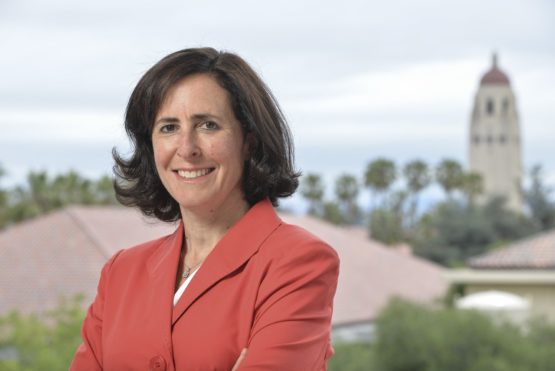Meet Stacey Bent, Stanford’s new vice provost for graduate education and postdoctoral affairs
Engineering professor and new Vice Provost Stacey Bent discusses how her office supports graduate students and postdocs and offers her best career advice.
Supporting graduate students and postdoctoral scholars is a second career for new Vice Provost Stacey Bent. As the Jagdeep and Roshni Singh Professor in the School of Engineering and Professor of Chemical Engineering, Bent has taught and mentored countless aspiring scientists in her lab, Bent Research Group. Now she’s bringing that experience to the role of Vice Provost for Graduate Education and Postdoctoral Affairs (VPGE), a position she started on Sept. 1.

Engineering professor Stacey Bent became Vice Provost on Sept. 1, 2019. (Courtesy of Vice Provost for Graduate Education and Postdoctoral Affairs) (Image credit: Rod Searcey)
Stanford News caught up with Bent to learn why she decided to step into an administrative position, how her office is supporting graduate students and postdoctoral scholars and what her best career advice is for students and researchers thinking about the future.
Why did you decide to take on this administrative position?
I thought I could have an impact and be helpful in supporting our graduate students and postdoctoral scholars in their academic pursuits. I also believed it was a really exciting time to be in this role because Stanford is in the middle of the Long-Range Planning, and there’s an opportunity to undertake initiatives to improve graduate and postdoctoral training. We offer great opportunities for our students and postdocs, but there’s always room to do even more.
How can graduate education and postdoctoral training at Stanford improve?
The VPGE office and the Office of Postdoctoral Affairs (OPA) are already doing a lot of work to prepare our students and postdocs to contribute to society and do great things in their chosen fields. We offer many educational and professional training opportunities that were developed over the last several years, which are fantastic.
I would like to help improve what we do on several fronts. I’d like to make advising of our graduate students and postdocs even better. I hope to develop initiatives to give our doctoral students the opportunity for meaningful on- and off-campus learning experiences to complement their dissertation work and prepare them for their future careers. I would also like to work on raising more fellowships for students and postdocs to ensure their financial support during their studies and training.
What do you think are the biggest challenges grad students and postdocs face today?
I would put them into two categories: local and global. Locally, affordability is particularly challenging for our students and postdocs. VPGE collaborates with other offices around campus to help address this.
Globally, it’s an interesting time because the world is changing, and career paths are changing. I think the single-career trajectory is no longer the norm. People move around, and we need to train them to be successful in that kind of future.
You received your PhD in chemistry from Stanford and completed postdoctoral research at Bell Laboratories. What was that experience like?
I didn’t take a wide range of classes as a graduate student because I was very focused on my own research. So I was perhaps narrower in my studies than many of our PhD students today. It was an amazing time because I spent countless hours thinking really, really deeply about an area that interested me.
But it wasn’t all perfect, and it’s important to recognize that graduate school and postdoctoral training can be really challenging times. For example, I got married when I was a graduate student and had a long-distance relationship for a long time. I also had my first child when I was a postdoc, so I understand how much juggling there is between one’s personal life and professional life.
What’s your best career advice for grad students and postdocs?
One piece of advice that I give people is not to confine themselves too early to what they think they want to do. Be open-minded about your career, pursue what you’re interested in, but also keep an eye on the impact of your work.
How can graduate students and postdoctoral scholars reach you?
I am eager to hear from graduate students and postdoctoral scholars and prioritize ways we can collaborate to address their communities’ educational needs and pursue exciting new opportunities.
I’m meeting with members of the Graduate Student Council (GSC) and the Stanford University Postdoctoral Association (SURPAS). In the coming months, I’ll be holding office hours and one or more town halls. In the meantime, students and postdocs can email me their ideas and concerns at vpge@stanford.edu.
